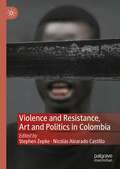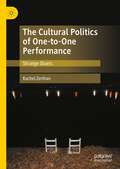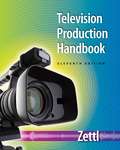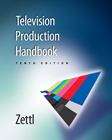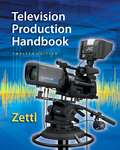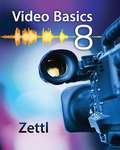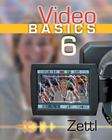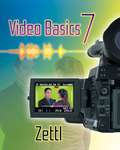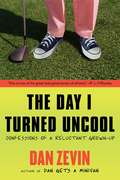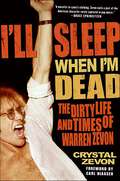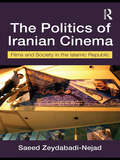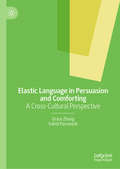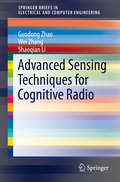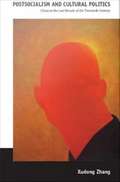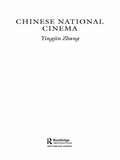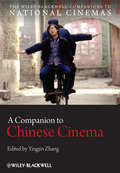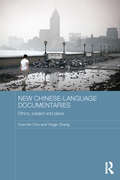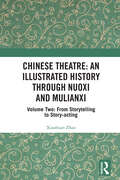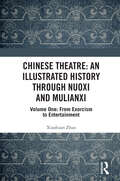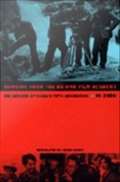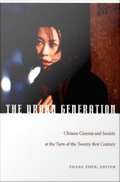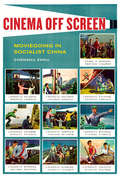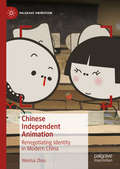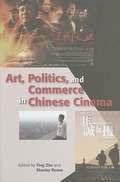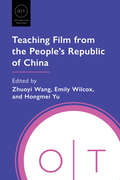- Table View
- List View
Violence and Resistance, Art and Politics in Colombia
by Stephen Zepke Nicolás Alvarado CastilloThis book explores the historical and contemporary connections between art and politics in Colombia. These relations are unique because of the ways in which they are saturated by violence, as the country has passed through conquest, struggles for Independence, fighting between political factions, civil war, paramilitaries, narco-traffickers and state violence. This seemingly unending stream of violence gives art in Colombia one of its main themes. The lavishly illustrated essays, written by Colombian authors, examine Colombian visual arts, music, theatre, literature, cinema, indigenous arts, popular culture, militant publications and recent protest movements, analysing them with tools drawn from contemporary philosophy and theory. Approaches include decolonisation theory, cosmopolitics, anthropology after the ontological turn, Colombian philosophy, feminism, and French theory. The essays all offer powerful understandings of how art has not only been complicit in perpetuating political violence in Colombia, but also how it has been a vital form of analysis and resistance.
The Cultural Politics of One-to-One Performance: Strange Duets
by Rachel ZerihanThis monograph is the first study to critically examine works of performance made for an audience of one. Despite being a prolific feature of the performance scene since the turn of the millennium, critical writing about this area of contemporary practice remains scarce. This book proposes a genealogy of the curious relationship between solo performer and lone spectator through lineages in the histories of live art, visual art and theatre practices. Drawing on one-to-one performances by artists including Marilyn Arsem, Oreet Ashery, Franko B, Rosana Cade, Jess Dobkin, Karen Finley, David Hoyle, Adrian Howells, Kira O’Reilly, Barbara T Smith and Julie Tolentino, Rachel Zerihan produces research that is both affective and critical. This performance analysis proposes four frameworks through which to examine the significance and challenge of this work: cathartic, social, explicit and economic. One-to-one performance is proposed as a rich portal for examining the cultural politics of contemporary society. The book will appeal to students and scholars from performance studies, theatre, visual art and cultural studies.
Television Production Handbook
by Herbert ZettlIn Herbert Zettl's field-defining text TELEVISION PRODUCTION HANDBOOK, the author emphasizes how production proceeds in the digital age -- from idea to image -- and how it moves through the three major phases, from preproduction to production to postproduction. In this context, you will learn about the necessary tools, examine what they can and cannot do, and explore how they are used to ensure maximum efficiency and effectiveness. This edition also features the latest digital equipment and production techniques, including HDV and HDTV.
Television Production Handbook
by Herbert ZettlThis practical textbook explains the basic workings behind the television camera, studio lighting equipment, microphones, and the video recording system, then outlines the job duties performed by graphic designers, the technical crew, news production personnel, floor managers, producers, and directors. The ninth edition adds a section on high definition video. Annotation ©2005 Book News, Inc., Portland, OR (booknews.com)
Television Production Handbook (Twelfth Edition)
by Herbert ZettlIn the field-defining text TELEVISION PRODUCTION HANDBOOK, author Herbert Zettl emphasizes how production proceeds in the digital age-from idea to image-and how it moves through the three major phases, from preproduction to production to postproduction. In this context, readers will learn about the necessary tools, examine what they can and cannot do, and explore how they are used to ensure maximum efficiency and effectiveness. This edition features the latest digital equipment and production techniques, including including stereo 3D, 3D camcorders, 4K and 8K digital cinema cameras, portable switchers, LED lighting instruments, and digital lighting control systems.
Video Basics
by Herbert ZettlReflecting the latest from real-world practice, VIDEO BASICS, 8th Edition, by Emmy award-winning producer, director, and innovator Herbert Zettl delivers the most authoritative, current, and technically accurate guide to video production available. Concise yet thorough, the text moves you quickly from video concepts and processes to production tools and techniques, and -- ultimately -- the production environment (studio and field, indoors and out) and its effects. A more conceptual framework helps you progress from the idea (what to create) to the image (how to create) on video. In addition, the accompanying MindTap digital experience helps you ensure your course success with a range of interactive study tools.
Video Basics
by Herbert ZettlHerbert Zettl draws on his expertise and field experience to bring you the sixth edition of VIDEO BASICS, the handiest and most authoritative, current, and technically accurate student guide to video production available. Meeting the need for a briefer book, this text distills comprehensive video instruction so that it can be covered in a single semester. The book moves students from video concepts and processes to production tools and techniques and, finally, to the production environment (studio and field, inside and outside) and its effects. A more conceptual framework leads students from the idea (what to create) to the image (how to create) on video. Contrary to the previous editions of VIDEO BASICS, which reflected the transition from analog to digital technology, VIDEO BASICS, 6th Edition, acknowledges that digital video is a firmly established medium. References to analog are made only to help explain the digital process or the analog equipment that is still in use.
Video Basics 7
by Herbert ZettlHerbert Zettl draws on his expertise and field experience to bring you the seventh edition of VIDEO BASICS, the handiest and most authoritative, current, and technically accurate student guide to video production available. Meeting the need for a briefer book, this text distills comprehensive video instruction so that it can be covered in a single semester. The book moves students from video concepts and processes to production tools and techniques and, finally, to the production environment (studio and field, inside and outside) and its effects. A more conceptual framework leads students from the idea (what to create) to the image (how to create) on video.
The Day I Turned Uncool
by Dan ZevinSooner or later, each of us must face the day we develop a disturbing new interest in lawn care; the day we order sauvignon blanc instead of Rolling Rock; the day we refuse to see any concert where we cannot sit down. Sooner or later, each of us must face the day we turn uncool. Dan Zevin, who “was never exactly Fonz-like to begin with,” is having a hilariously hard time moving from his twenties to his thirties, and he confesses everything in these comic not-coming-of-age tales. As he shamefully employs his first cleaning lady, becomes abnormally attached to his dog, and commits flagrant acts of home improvement, Dan’s headed for an early midlife crisis—and a better-late-than-never revelation: Growing up is really nothing to be reluctant about. In fact, it’s very cool.
I'll Sleep When I'm Dead: The Dirty Life and Times of Warren Zevon
by Crystal ZevonWhen Warren Zevon died in 2003, he left behind a rich catalog of dark, witty rock 'n' roll classics, including "Lawyers, Guns and Money," "Excitable Boy," and the immortal "Werewolves of London." He also left behind a fanatical cult following and veritable rock opera of drugs, women, celebrity, genius, and epic bad behavior. As Warren once said, "I got to be Jim Morrison a lot longer than he did."Narrated by his former wife and longtime co-conspirator, Crystal Zevon, this intimate and unusual oral history draws on interviews with Bruce Springsteen, Stephen King, Bonnie Raitt, and numerous others who fell under Warren's mischievous spell. Told in the words and images of the friends, lovers, and legends who knew him best, I'll Sleep When I'm Dead captures Warren Zevon in all his turbulent glory.
The Politics of Iranian Cinema: Film and Society in the Islamic Republic (Iranian Studies)
by Saeed Zeydabadi-NejadIran has undergone considerable social upheaval since the revolution and this has been reflected in its cinema. Drawing on first-hand interviews and detailed ethnographic research, this book explores how cinema is engaged in the dynamics of social change in contemporary Iran. The author not only discusses the practices of regulation and reception of films from major award winning directors but also important mainstream filmmakers such as Hatamikia and Tabizi. Contributing to ethnographic accounts of Iranian governance in the field of culture, the book reveals the complex behind-the-scenes negotiations between filmmakers and the authorities which constitute a major part of the workings of film censorship. The author traces the relationship of Iranian cinema to recent social/political movements in Iran, namely reformism and women’s movement, and shows how international acclaim has been instrumental in filmmakers’ engagement with matters of political importance in Iran. This book will be a valuable tool for courses on film and media studies, and will provide a significant insight into Iranian cultural politics for students of cultural studies and anthropology, Middle Eastern and Iranian studies.
Elastic Language in Persuasion and Comforting: A Cross-Cultural Perspective
by Grace Zhang Vahid ParvareshThis innovative book examines the discourse of reality television, and the elasticity of language in the popular talent show The Voice from a cross-cultural perspective. Analysing how and why elastic language is used in persuasion and comforting, a comparison between Chinese and English is made, and the authors highlight the special role that elastic language plays in effective interactions and strategic communication. Through the lens of the language variance of two of the world’s most commonly spoken languages, the insights and resources provided by this book are expected to advance knowledge in the fields of contrastive pragmatics and cross-cultural communication, and inform strategies in bridging different cultures. This study highlights the need to give the elastic use of language the attention it deserves, and reveals how language is non-discrete and strategically stretchable. This book will be of interest to academics and postgraduate students engaged in elastic/vague language studies, cross-cultural pragmatics, media linguistics, discourse analysis, sociolinguistics and communication studies.
Advanced Sensing Techniques for Cognitive Radio (SpringerBriefs in Electrical and Computer Engineering)
by Wei Zhang Guodong Zhao Shaoqian LiThis SpringerBrief investigates advanced sensing techniques to detect and estimate the primary receiver for cognitive radio systems. Along with a comprehensive overview of existing spectrum sensing techniques, this brief focuses on the design of new signal processing techniques, including the region-based sensing, jamming-based probing, and relay-based probing. The proposed sensing techniques aim to detect the nearby primary receiver and estimate the cross-channel gain between the cognitive transmitter and primary receiver. The performance of the proposed algorithms is evaluated by simulations in terms of several performance parameters, including detection probability, interference probability, and estimation error. The results show that the proposed sensing techniques can effectively sense the primary receiver and improve the cognitive transmission throughput. Researchers and postgraduate students in electrical engineering will find this an exceptional resource.
Postsocialism and Cultural Politics: China in the Last Decade of the Twentieth Century
by Xudong ZhangIn Postsocialism and Cultural Politics, Xudong Zhang offers a critical analysis of China's "long 1990s," the tumultuous years between the 1989 Tiananmen Square crackdown and China's entry into the World Trade Organization in 2001. The 1990s were marked by Deng Xiaoping's market-oriented reforms, the Taiwan missile crisis, the Asian financial crisis, and the end of British colonial rule of Hong Kong. Considering developments including the state's cultivation of a market economy, the aggressive neoliberalism that accompanied that effort, the rise of a middle class and a consumer culture, and China's entry into the world economy, Zhang argues that Chinese socialism is not over. Rather it survives as postsocialism, which is articulated through the discourses of postmodernism and nationalism and through the co-existence of multiple modes of production and socio-cultural norms. Highlighting China's uniqueness, as well as the implications of its recent experiences for the wider world, Zhang suggests that Chinese postsocialism illuminates previously obscure aspects of the global shift from modernity to postmodernity. Zhang examines the reactions of intellectuals, authors, and filmmakers to the cultural and political conflicts in China during the 1990s. He offers a nuanced assessment of the changing divisions and allegiances within the intellectual landscape, and he analyzes the postsocialist realism of the era through readings of Mo Yan's fiction and the films of Zhang Yimou. With Postsocialism and Cultural Politics, Zhang applies the same keen insight to China's long 1990s that he brought to bear on the 1980s in Chinese Modernism in the Era of Reforms.
Chinese National Cinema (National Cinemas #20)
by Yingjin ZhangThis introduction to Chinese national cinema covers three 'Chinas': mainland China, Hong Kong and Taiwan. Historical and comparative perspectives bring out the parallel developments in these three Chinas, while critical analysis explores thematic and stylistic changes over time. As well as exploring artistic achievements and ideological debates, Yingjin Zhang examines how - despite the pressures placed on the industry from state control and rigid censorship - Chinese national cinema remains incapable of projecting a single unified picture, but rather portrays many different Chinas.
A Companion to Chinese Cinema (Wiley Blackwell Companions to National Cinemas #20)
by Yingjin ZhangA Companion to Chinese Cinema is a collection of original essays written by experts in a range of disciplines that provide a comprehensive overview of the evolution and current state of Chinese cinema. Represents the most comprehensive coverage of Chinese cinema to date Applies a multidisciplinary approach that maps the expanding field of Chinese cinema in bold and definitive ways Draws attention to previously neglected areas such as diasporic filmmaking, independent documentary, film styles and techniques, queer aesthetics, star studies, film and other arts or media Features several chapters that explore China’s new market economy, government policy, and industry practice, placing the intricate relationship between film and politics in a historical and international context Includes overviews of Chinese film studies in Chinese and English publications
New Chinese-Language Documentaries: Ethics, Subject and Place (Media, Culture and Social Change in Asia)
by Yingjin Zhang Kuei-fen ChiuDocumentary filmmaking is one of the most vibrant areas of media activity in the Chinese world, with many independent filmmakers producing documentaries that deal with a range of sensitive socio-political problems, bringing to their work a strongly ethical approach. This book identifies notable similarities and crucial differences between new Chinese-language documentaries in mainland China and Taiwan. It outlines how documentary filmmaking has developed, contrasts independent documentaries with dominant official state productions, considers how independent documentary filmmakers go about their work, including the work of exhibiting their films and connecting with audiences, and discusses the content of their documentaries, showing how the filmmakers portray a wide range of subject matter regarding places and people, and how they deal with particular issues including the underprivileged, migrants and women in an ethical way. Throughout the book demonstrates how successful Chinese-language independent documentary filmmaking is, with many appearances at international film festivals and a growing number of award-winning titles.
Chinese Theatre: Volume Two: From Storytelling to Story-acting
by Xiaohuan ZhaoChinese Theatre: An Illustrated History Through Nuoxi and Mulianxi is the first book in any language entirely devoted to a historical inquiry into Chinese theatre through Nuoxi and Mulianxi, the two most representative and predominant forms of Chinese temple theatre. Volume Two is a continuation of the historical inquiry into Chinese theatre with focus shifted from Mulian storytelling to Mulian story-acting. Thus, this volume traces the historical trajectory of xiqu from Northern dramas to Southern dramas and from elite court theatre to mass regional theatre with pivotal forms and functions of Mulianxi examined, explicated and illustrated in association with the development of corresponding genres of xiqu. In so doing, every aspect of Mulianxi is considered not in the margins of xiqu but in and of itself. While this volume is primarily concerned with Mulianxi, references are also made to other forms of Chinese performing arts and temple theatre, Nuoxi in particular, as Mulianxi has been performed since the twelfth century as, or in company with, Nuoxi, to cleanse the community of evil spirits and epidemic diseases. This is an interdisciplinary book project that is aimed to help researchers and students of theatre history understand the ritual origins of Chinese theatre and the dynamic relationships among myth, ritual, religion and theatre.
Chinese Theatre: Volume One: From Exorcism to Entertainment
by Xioahuan ZhaoChinese Theatre: An Illustrated History Through Nuoxi and Mulianxi is the first book in any language entirely devoted to a historical inquiry into Chinese theatre through Nuoxi and Mulianxi, the two most representative and predominant forms of Chinese temple theatre. With a view to evaluating the role of temple theatre in the development of xiqu or traditional Chinese theatre and drama from myth to ritual to ritual drama to drama, Volume One provides a panoramic perspective that allows every aspect of Nuoxi to be considered, not in the margins of xiqu but in and of itself. Thus, this volume traces xiqu history from its shamanic roots in exorcism rituals of Nuo to various forms of ritual and theatrical performance presented at temple fairs, during community and calendrical festivals or for ceremonial functions over the course of imperial history, and into the twenty-first century, followed by an exploration of the scriptural origins and oral traditions of Mulianxi, with pivotal forms and functions of Nuoxi and Mulian storytelling, examined, explicated and illustrated in association with the development of corresponding genres of Chines performance literature and performing arts. This is an interdisciplinary book project that is aimed to help researchers and students of theatre history understand the ritual origins of Chinese theatre and the dynamic relationships among myth, ritual, religion, and theatre.
Memoirs from the Beijing Film Academy: The Genesis of China's Fifth Generation
by Ni ZhenAfter graduating from the Beijing Film Academy in 1982, directors like Chen Kaige and Zhang Yimou transformed Chinese cinema with Farewell My Concubine, Yellow Earth, Raise the Red Lantern, and other international successes. Memoirs from the Beijing Film Academy tells the riveting story of this class of 1982, China's famous "Fifth Generation" of filmmakers. It is the first insider's account of this renowned cohort to appear in English. Covering these directors' formative experiences during China's tumultuous Cultural Revolution and later at the Beijing Film Academy, Ni Zhen--who was both their screenwriter and teacher--provides unique insights into the origins of the Fifth Generation's creativity. Drawing on his personal knowledge and interviews conducted especially for this volume, Ni Zhen demonstrates the diversity of the Fifth Generation. He comments on the breadth of styles and themes explored by its members and introduces a range of male and female directors, cinematographers, and production designers famous in China but less well-known internationally. The book contains vivid descriptions of the production processes of two pioneering films--One and Eight and Yellow Earth.
The Urban Generation: Chinese Cinema and Society At the Turn of the Twenty-first Century
by Zhang ZhenSince the early 1990s, while mainland China's state-owned movie studios have struggled with financial and ideological constraints, an exciting alternative cinema has developed. Dubbed the "Urban Generation," this new cinema is driven by young filmmakers who emerged in the shadow of the events at Tiananmen Square in 1989. What unites diverse directors under the "Urban Generation" rubric is their creative engagement with the wrenching economic and social transformations underway in China. Urban Generation filmmakers are vanguard interpreters of the confusion and anxiety triggered by the massive urbanization of contemporary China. This collection brings together some of the most recent original research on this emerging cinema and its relationship to Chinese society. The contributors analyze the historical and social conditions that gave rise to the Urban Generation, its aesthetic innovation, and its ambivalent relationship to China's mainstream film industry and the international film market. Focusing attention on the Urban Generation's sense of social urgency, its documentary impulses, and its representations of gender and sexuality, the contributors highlight the characters who populate this new urban cinema--ordinary and marginalized city dwellers including aimless bohemians, petty thieves, prostitutes, postal workers, taxi drivers, migrant workers--and the fact that these "floating urban subjects" are often portrayed by non-professional actors. Some essays concentrate on specific films (such as Shower and Suzhou River) or filmmakers (including Jia Zhangke and Zhang Yuan), while others survey broader concerns. Together the thirteen essays in this collection give a multifaceted account of a significant, ongoing cinematic and cultural phenomenon. Contributors. Chris Berry, Yomi Braester, Shuqin Cui, Linda Chiu-han Lai, Charles Leary, Sheldon H. Lu, Jason McGrath, Augusta Palmer, Brnice Reynaud, Yaohua Shi, Yingjin Zhang, Zhang Zhen, Xueping Zhong
Cinema Off Screen: Moviegoing in Socialist China
by Chenshu ZhouAt a time when what it means to watch movies keeps changing, this book offers a case study that rethinks the institutional, ideological, and cultural role of film exhibition, demonstrating that film exhibition can produce meaning in itself apart from the films being shown. Cinema Off Screen advances the idea that cinema takes place off screen as much as on screen by exploring film exhibition in China from the founding of the People’s Republic in 1949 to the end of the Cold War in the early 1990s. Drawing on original archival research, interviews, and audience recollections, Cinema Off Screen decenters the filmic text and offers a study of institutional operations and lived experiences. Chenshu Zhou details how the screening space, media technology, and the human body mediate encounters with cinema in ways that have not been fully recognized, opening new conceptual avenues for rethinking the ever-changing institution of cinema.
Chinese Independent Animation: Renegotiating Identity in Modern China (Palgrave Animation)
by Wenhai ZhouThis study of ‘independent’ animation opens up a quietly subversive and vibrant dimension of contemporary Chinese culture which, hitherto, has not received as much attention as dissident art or political activism. Scholarly interest in Chinese animation has increased over the last decade, with attention paid to the conventional media circle of production, distribution and consumption. The ‘independent’ sector has been largely ignored however, until now. By focusing on distinctive independent artists like Pisan and Lei Lei, and situating their work within the present day media ecology, the author examines the relationship between the genre and the sociocultural transformation of contemporary China. Animation, the author argues, has a special significance, as the nature of the animation text is itself multilayered and given to multiple interpretations and avenues of engagement. Through an examination of the affordances of this ‘independent’ media entity, the author explores how this multifaceted cultural form reveals ambiguities that parallel contradictions in art and society. In so doing, independent animation provides a convenient ‘mirror’ for examining how recent social upheavals have been negotiated, and how certain practitioners have found effective ways for discussing the post-Socialist reality within the current political configuration.
Art, Politics, and Commerce in Chinese Cinema
by Ying ZhuArt, politics and commerce are intertwined everywhere, but in China the interplay is explicit, intimate and elemental, and nowhere more so than in the film industry. Understanding this interplay in the era of market reform and globalization is essential t
Teaching Film from the People's Republic of China (Options for Teaching)
by Zhuoyi Wang, Emily Wilcox, and Hongmei YuThis volume brings a diverse range of voices--from anthropology, communication studies, ethnomusicology, film, history, literature, linguistics, sociology, theater, and urban geography--into the conversation about film from the People's Republic of China. Essays seek to answer what films can reveal or obscure about Chinese history and society and demonstrate how studying films from the PRC can introduce students to larger issues of historical consciousness and media representation.The volume addresses not only postsocialist fictional films but also a wide variety of other subjects including socialist period films, documentaries, films by or about people from ethnic minority groups, film music, the perspectives of female characters, martial arts cinema, and remakes of South Korean films. By exploring how films represent power, traditions, and ideologies, students learn about both the complexity of the PRC and the importance of cross-cultural and cross-ideological understanding.
